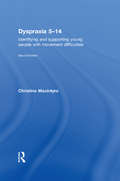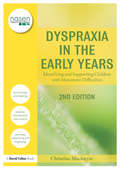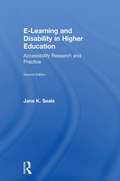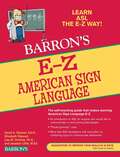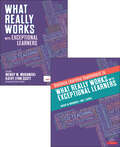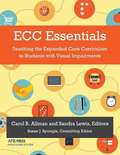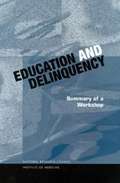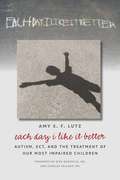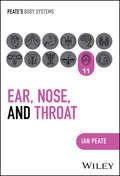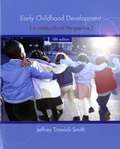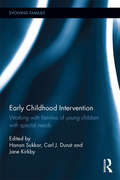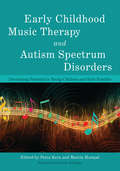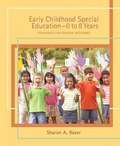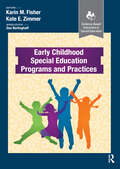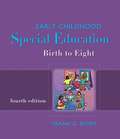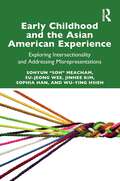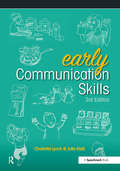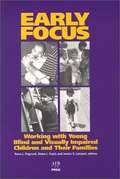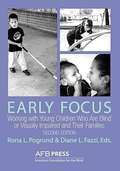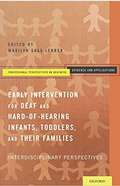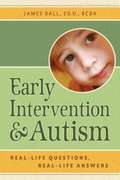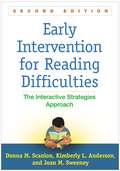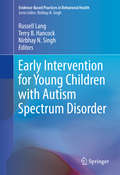- Table View
- List View
Dyspraxia 5-14: Identifying and Supporting Young People with Movement Difficulties (nasen spotlight)
by Christine MacintyreDyspraxia is increasingly common in young children. This fully revised and updated edition of Christine Macintyre’s invaluable companion explains the difficulties faced by children with dyspraxia in growing up and offers suggestions as to how these might be alleviated. In this book the children themselves, along with their parents and teachers, talk about how the difficulties change as the transition is made from primary to secondary school. Children with dyspraxia are frequently beset by frustrations as a result of their differences, can be misunderstood both at home and at school, and are very often bullied. This practical guide considers: the issue of giving children labels strategies to reduce stress the value of movement programmes raising self-esteem the transition to secondary school particular challenges faced during Puberty/adolescence handwriting as an indicator of dyspraxia. Including practical activities with additional material for secondary pupils this book shows children how to articulate their differences using individualised explanations, and then go on to succeed having recognised where their talents lie. Dyspraxia 5-14 is essential reading for teachers, parents, SENCos, teaching assistants and trainee teachers who want to improve their understanding of dyspraxia and its implications for children in Key stages 1-3.
Dyspraxia in the Early Years: Identifying and Supporting Children with Movement Difficulties (nasen spotlight)
by Christine MacintyreToday there are more children than ever before in need of a variety of additional support needs, and many of these children have poor movement as a key contributory factor. Even in children with no specific ‘label’, movement is being found to be linked to learning, and educational professionals need to understand what is amiss and how to support children who do not meet their motor milestones at the correct time. The brand new topic areas featured in this comprehensive and practical new edition include: a discussion of terminology and labelling (in light of current inclusion guidelines) a range of age specific activities a section on the neurology of dyspraxia, showing the motor pathways that are energised and define motor competence a greater emphasis on balance, coordination and control examples from children of how movement is dependent on planning, sequencing and organising more practical activities that can form the basis of a programme to support the children. Practical strategies are provided throughout this authoritative book, so that teachers and other professionals can identify and understand movement difficulties, are empowered to support the children, and work effectively with the parents.
E-Learning and Disability in Higher Education: Accessibility Research and Practice
by Jane K. SealeMost people working within the higher education sector understand the importance of making e-learning accessible to students with disabilities, yet it is not always clear exactly how this should be accomplished. E-Learning and Disability in Higher Education evaluates current accessibility practice and critiques the extent to which 'best' practices can be confidently identified and disseminated. This second edition has been fully updated and includes a focus on research that seeks to give 'voice' to disabled students in a way that provides an indispensible insight into their relationship with technologies and the institutions in which they study. Examining the social, educational, and political background behind making online learning accessible in higher and further education, E-Learning and Disability in Higher Education considers the roles and perspectives of the key stake-holders involved in e-learning: lecturers, professors, instructional designers, learning technologists, student support services, staff developers, and senior managers and administrators.
E-Z American Sign Language, 3rd Edition (Barron's E-Z Series)
by Elizabeth Stewart David Stewart Lisa DimlingA Simon & Schuster eBook. Simon & Schuster has a great book for every reader.
EBUNDLE: What Really Works With Exceptional Learners + Distance Learning Supplement
by Wendy Weichel Murawski Kathy Lynn Gandhi Amy I. GainesAuthors Wendy Murawski and Amy Gaines have created this supplement to the bestselling What Really Works With Exceptional Learners to respond to the need for information on best practices for students with special needs in distance, hybrid, and remote learning settings. Packed with practical strategies, research, and tried-and-true advice, this supplement provides educators with resources that will help their students not only learn, but also thrive. This supplement offers current research related to topic such as inclusive practices, specially designed instruction (SDI), social-emotional learning, teacher burnout, UDL, collaborating with co-teachers, and communicating with parents. The authors then highlight actions to avoid and actions to embrace. Call-out boxes identify key concepts, ways to implement technology, and where to find additional information in other chapters of What Really Works with Exceptional Learners. Tables and templates help readers quickly learn and utilize additional strategies. Additional resources and references are also offered for those who would like to go deeper.
ECC Essentials: Teaching The Expanded Core Curriculum To Students With Visual Impairments
by Carol B. AllmanThe book discusses the nine ECC content areas along with relevant assessments, the important roles of teachers of students with visual impairments as well as their students' parents, and learning activities and resources.
EDUCATION AND DELINQUENCY: Summary of a Workshop
by Panel on Juvenile Crime: Prevention Treatment ControlA report on Education and Delinquency
Each Day I Like It Better: Autism, ECT, and the Treatment of Our Most Impaired Children
by Amy LutzIn the fall of 2009, Amy Lutz and her husband, Andy, struggled with one of the worst decisions parents could possibly face: whether they could safely keep their autistic ten-year-old son, Jonah, at home any longer. Multiple medication trials, a long procession of behavior modification strategies, and even an almost year-long hospitalization had all failed to control his violent rages. Desperate to stop the attacks that endangered family members, caregivers, and even Jonah himself, Amy and Andy decided to try the controversial procedure of electroconvulsive therapy or ECT. Over the last three years, Jonah has received 136 treatments. His aggression has greatly diminished, and for the first time Jonah, now fourteen, is moving to a less restricted school. Each Day I Like It Better recounts the journeys of Jonah and seven other children and their families (interviewed by the author) in their quests for appropriate educational placements and therapeutic interventions. The author describes their varied, but mostly successful, experiences with ECT. A survey of research on pediatric ECT is incorporated into the narrative, and a foreword by child psychiatrist Dirk Dhossche and ECT researcher and practitioner Charles Kellner explains how ECT works, the side effects patients may experience, and its current use in the treatment of autism, catatonia, and violent behavior in children.
Each Day I Like It Better: Autism, ECT, and the Treatment of Our Most Impaired Children
by Amy S. LutzIn the fall of 2009, Amy Lutz and her husband, Andy, struggled with one of the worst decisions parents could possibly face: whether they could safely keep their autistic ten-year-old son, Jonah, at home any longer. Multiple medication trials, a long procession of behavior modification strategies, and even an almost year-long hospitalization had all failed to control his violent rages. Desperate to stop the attacks that endangered family members, caregivers, and even Jonah himself, Amy and Andy decided to try the controversial procedure of electroconvulsive therapy or ECT. Over the last three years, Jonah has received 136 treatments. His aggression has greatly diminished, and for the first time Jonah, now fourteen, is moving to a less restricted school. Each Day I Like It Better recounts the journeys of Jonah and seven other children and their families (interviewed by the author) in their quests for appropriate educational placements and therapeutic interventions. The author describes their varied, but mostly successful, experiences with ECT. A survey of research on pediatric ECT is incorporated into the narrative, and a foreword by child psychiatrist Dirk Dhossche and ECT researcher and practitioner Charles Kellner explains how ECT works, the side effects patients may experience, and its current use in the treatment of autism, catatonia, and violent behavior in children.
Eagles Don't Eat Worms
by Linda Kudlik Jack WeylandJeff steals a guide dog to earn a reward. He is caught, and for two months he must live as a blind person. He learns a lot about himself and others around him In addition the police officer falls in love with the blind woman. This is Morman fiction.
Ear, Nose and Throat (Peate's Body Systems)
by Ian PeatePEATE’S BODY SYSTEMS EAR, NOSE AND THROAT A CONCISE, ILLUSTRATED, AND ACCESSIBLE GUIDE TO THE EAR, NOSE AND THROAT Each of the twelve volumes in Peate’s Body Systems series is rooted in the belief that a deep and thorough understanding of the human body is essential for providing the highest standard of care. Offering clear, accessible and up-to-date information on different body systems, this series bridges the gap between complex scientific concepts and practical, everyday applications in health and care settings. This series makes for an invaluable resource for those committed to understanding the intricacies of human biology, physiology and the various systems that sustain life. Ear, Nose and Throat is the perfect companion for students and newly registered practitioners across nursing and allied health fields with an interest in Ear, Nose and Throat (ENT) care, providing a comprehensive yet easy-to-digest guide for both academic and clinical application. Equips healthcare students and practitioners with the necessary information to provide safe and competent careFeatures colourful illustrations to aid comprehension, clarify complicated concepts, and render content more engaging and accessibleEmpowers readers to adapt to a rapidly evolving healthcare landscape, preparing them for the future of healthcare deliveryContains information necessary for effective patient care of those with tinnitus, Ménière’s disease, sinusitis, and other ENT diseases and conditions
Early Childhood Development: A Multicultural Perspective
by Jeffrey W. Trawick-SmithEarly Childhood Development: A Multicultural Perspective, Fifth Edition addresses both typical and atypical child development from birth through age eight. This text highlights the diversity of child development, preparing professionals to meet the unique needs of children from a wide variety of backgrounds.
Early Childhood Intervention: Working with Families of Young Children with Special Needs (Evolving Families)
by Hanan Sukkar Carl J. Dunst Jane KirkbyEarly childhood is considered a critical but often vulnerable period in a child’s development where early identification and intervention can be crucial for improving children’s developmental outcomes. Systems and family-centred perspectives are vital to support families and build their capacities to lead normalized lives with improved family quality of life. This book explores the family-centred practices and systems factors which influence families’ experiences raising children with complex needs. It also considers the ways in which professionals can work with families to build and support parent and child competence. Conceptual and practical work from Australia, Canada, Europe and the United States present descriptions of and implications for different family system frameworks and early-childhood programs. Contributors in this edited volume bring together contemporary information that bridges the research to practice gap in supporting families of young children with disabilities or delays. Chapters include: Early Intervention for Young Children with Developmental Delays: Contributions of the Developmental Systems Approach Family Composition and Family Needs in Australia: What Makes a Family? Working with Families in Early Childhood Intervention: Family-Centred Practices in an Individualised Funding Landscape Family Systems and Family-Centred Intervention Practices in Portugal and Spain: Iberian Reflections on Early Childhood Intervention This book will attract the attention scholars of Parenting and Families; Child Development and Childcare.
Early Childhood Music Therapy and Autism Spectrum Disorders
by Edited by Petra Kern Marcia HumpalThis comprehensive book includes an overview of recent developments in ASD and effective music therapy interventions based on ASD-specific approaches, instructional strategies and techniques for use in children's natural environments. Therapists wishing to conduct family-centered practice and to support parents integrate music into home routines will find a wealth of information, together with insights from music therapists who are parents of children with ASD. The book also looks at collaboration and consultation with interdisciplinary team members, including early childhood educators, speech-language pathologists and occupational therapists. Case scenarios, examples, checklists, charts, tip sheets, music scores, and online resources make this book accessible for everyone. Throughout the book's sixteen chapters, renowned experts share knowledge and practical applications that will give music therapists, students, professionals, educators, families and anyone interested in working with young children with ASD, a detailed understanding of the implementation and range of music therapy practices that can benefit these children and their families.
Early Childhood Special Education (0 to 8 Years): Strategies for Positive Outcomes
by Sharon A. RaverFeaturing the application of evidence-based strategies, ecological and family-based approaches, effective learning, and the use of responsive cultural/linguistic practices, Early Childhood Education (0-8 Years): Strategies for Positive Outcomes, prepares students for all the professional knowledge and skill competencies they need to promote optimal development in infant and toddlers (0-3), preschoolers (3-5), and primary-aged (6-8) children with special needs. Using real-life case studies to illustrate recommended practices, the book clearly presents disability characteristics, assessment practices, and easy-to-implement interventions for inclusive and special education settings, while giving students all the resources they need to master and apply the material. Highlights of This First Edition: Prepares students with ALL the professional knowledge and skill competencies necessary to promote optimal development in children with special needs from birth through 8 years old. Highlights intervention techniques from special education, speech-language pathology, occupational/physical therapy, and the fields of vision and hearing impairments. Uses a real-life case study in each chapter to illustrate recommended practices and strategies. Examines the legal, philosophical, and instructional tenets of the field of Early Childhood Special Education in detail, including IDEA 2004. Features how to use evidence-based practices and strategies that maximize communicative, cognitive/literacy, fine and gross motor, adaptive, and social-emotional development in infants and toddlers, preschoolers, and primary-aged children.
Early Childhood Special Education Programs and Practices (Evidence-Based Instruction in Special Education)
by Karin Fisher Kate ZimmerEarly Childhood Special Education Programs and Practices is a special education textbook that prepares pre- and in-service teachers with the knowledge, skills, and dispositions to deliver evidence-based instruction to promote positive academic and behavioral outcomes for young children (prekindergarten through second grade) with development delays and/or disabilities.Early Childhood Special Education Programs and Practices intertwines inclusive early childhood practices by using real-life anecdotes to illustrate evidence-based practices (EBPs) and procedures. The authors, experts in their fields, emphasize high-leverage practices, EBPs, and culturally sustaining pedagogy and align them with the practices, skills, and competencies recommended by the Council for Exceptional Children’s Division for Early Childhood. Families, administrators, and teacher educators of pre- and in-service early childhood special education and general early childhood education programs alike will find this book useful.Included in Early Childhood Special Education Programs and Practices are: An overview of early childhood and development of children ages 4 to 8 Strategies for relationship building with students, families, communities, and school personnel Tips on creating a caring and positive classroom environment Chapters devoted to evidence-based instruction in core subjects of reading and writing, mathematics, science, and social studies for students with disabilities in pre-K to second grade More than 80 images, photos, tables, graphs, and case studies to illustrate recommended Practices Also included with the text are online supplemental materials for faculty use in the classroom, consisting of an Instructor’s Manual and PowerPoint slides.Created with the needs of early childhood special educators in mind, Early Childhood Special Education Programs and Practices provides pre- and in-service teachers with the skills and practices they need to serve young children, their families, and communities across settings.
Early Childhood Special Education: Birth to Eight
by Frank G. BoweEarly Childhood Special Education: Birth to Eight is now available in the 4th edition. The 4th edition expands coverage of pre-academics and academics, responding to No Child Left Behind and IDEA 2004. The five key areas of development: communication, physical, cognitive, social/emotional, and adaptive, all include updated coverage. This is the only text on the market that addresses all of early childhood, age birth through eight, and all of early childhood special education. The text also takes into consideration that early childhood special education is a field driven by federal law, and contains complete coverage of those laws. Each chapter has opening questions, ending questions, and activities to help the student learn and retain the information. There is a full chapter devoted to research, and an online companion that serves to supplement the text and offers up to the minute content updates. The student will appreciate the outstanding readability of this updated, authoritative text.
Early Childhood and the Asian American Experience: Exploring Intersectionality and Addressing Misrepresentations
by Sohyun "Soh" Meacham Su-Jeong Wee Jinhee Kim Sophia Han Wu-Ying HsiehThis essential and urgent book presents research-based understandings about Asian American early childhood, bringing to light the battle Asian Americans face against American nativism from their early years’ experiences. The first of its kind in academic literature, the book addresses the well-known issue of underrepresentation of Asian Americans in early childhood education research and practice, and in American society in general. Using the intersectionality and multiple identities perspectives, the authors explore a myriad of inaccurate cultural perceptions and misrepresentations, centering within-group differences among Asian American children and giving particular attention to disempowered groups among them. Issues related to socioeconomic status, gender, dis/abilities, linguistic backgrounds, and minority groups among Asian American populations are addressed, with implications for researchers and educators as well as context for examining the policies that cause inequities among Asian American children. This book is key reading for early childhood education researchers, professors, and graduate students to become more productively engaged in discussions and practices toward racial justice.
Early Communication Skills: 3rd edition (Early Skills)
by Charlotte Lynch Julia Kidd'Early Communication Skills' has been a popular and widely used publication since becoming available in 1991. Now in its third edition, the resource retains its original approach to communication, providing a source of fresh educational and therapeutic ideas for pre-school children. Special features: a question and answer section designed to answer all common concerns; exercise and worksheets; over 100 activities are provided, spanning all areas of communication from pre-verbal skills to early words. Charlotte Lynch, Paediatric Speech and Language Therapist. Julia Kidd, Paediatric Speech and Language Therapist.
Early Focus: Working With Young Blind or Visually Impaired Children and Their Families
by Jessica S. Lambert Diane L. Fazzi Rona L. PogrundStressing the importance of early intervention in working with children with visual impairment, Pogrund (formerly special education, California State U.) and Fazzi (special education, California State U.) offer practitioners (teachers and other specialized professionals) an edited guide to working with children under age five. Eleven chapters review the developmental areas that are likely to be affected by vision loss and discuss the theory and knowledge base behind suggested educational practices in these areas. Chapters cover working with families, medical and functional implications, cognitive development, literacy, social development, promotion of independence and daily living skills, behavioral supports, motor and mobility development, and working with other professionals. Annotation (c)2003 Book News, Inc., Portland, OR (booknews.com)
Early Focus: Working with Young Children Who Are Blind or Visually Impaired and Their Families (Second Edition)
by Diane L. Fazzi Rona L. PogrundThe second edition of Early Focus: Working With Young Children Who Are Blind or Visually Impaired and Their Families is a comprehensive resource on early childhood visual impairment. It addresses the needs of children who are blind or visually impaired from the age of birth to 5.
Early Intervention For Deaf And Hard-of-hearing Infants, Toddlers, And Their Families: Interdisciplinary Perspectives
by Marilyn Sass-LehrerEarly Intervention for Deaf and Hard-of-Hearing Infants, Toddlers, and Their Families: Interdisciplinary Perspectives (Professional Perspectives On Deafness: Evidence and Applications) 1st Edition
Early Intervention and Autism: Real-Life Questions, Real-Life Answers
by James Ball<p>Leave behind confusing textbooks and unreliable websites. This book will guide you through your child's early years by providing sound advice based on over twenty years of experience. In an easy-to-read, question-answer format, Dr. Jim explains what makes your child tick, how to get the most out of early intervention services, and how to choose the most effective treatment options. <p>Helpful features include: <p> <li>10 Common Myths about Children with ASD, <li>7 Effective Teaching Strategies, <li>10 Behavior Rules to Live By, and <li>Must-have EI Goals and Objectives for Children with ASD.</li> <p> <p>In a special how-to section in the book, Dr. Jim walks you through a typical day in the life of a young child with autism, from the time the child wakes up to the time he goes to bed. You will learn what to do (and not do), what to say (and not say), and how to use the strategies outlined in the book to teach your child new skills, manage behavior, and have fun while learning! No matter what your level of "autism expertise," this is your game plan to start working with your child right away!</p>
Early Intervention for Reading Difficulties: The Interactive Strategies Approach
by Joan Sweeney Donna Scanlon Kimberly AndersonGrounded in a strong evidence base, this indispensable practitioner guide and text has given thousands of teachers tools to support the literacy growth of beginning and struggling readers in grades K-2. The interactive strategies approach (ISA) is organized around core instructional goals related to enhancing word learning and comprehension of text. The book provides guidance for assessment and instruction in whole-class, small-group, and one-to-one settings, using the curricular materials teachers already have.
Early Intervention for Young Children with Autism Spectrum Disorder
by Nirbhay N. Singh Russell Lang Terry B. HancockThis book examines early intensive behavioral intervention (EIBI) programs for young children with autism spectrum disorder (ASD). It analyzes current research on early intervention (EI) and explains the importance of accurate, timely detection of ASD in facilitating the use of EI. Chapters address five widely researched EIBI approaches: Discrete Trial Training, Pivotal Response Training, the Early Start Denver Model, Prelinguistic Milieu Teaching, and Enhanced Milieu Teaching. This in-depth study of current EIBI approaches offers a rigorous guide to earlier and more intensive interventions for children with ASD, leading to greater autonomy and improved later life outcomes for individuals. Featured topics include: Parent-implemented interventions and related issues. Evaluations of controversial interventions used with children with ASD. Factors contributing to rising ASD prevalence. Obstacles to obtaining accurate ASD diagnosis in young children. Early Intervention for Young Children with Autism Spectrum Disorder is an essential resource for researchers, clinicians, and graduate students in developmental, clinical child, and school psychology, behavioral therapy/rehabilitation, social work, public health, educational policy and politics, and related psychology and behavioral health fields.
